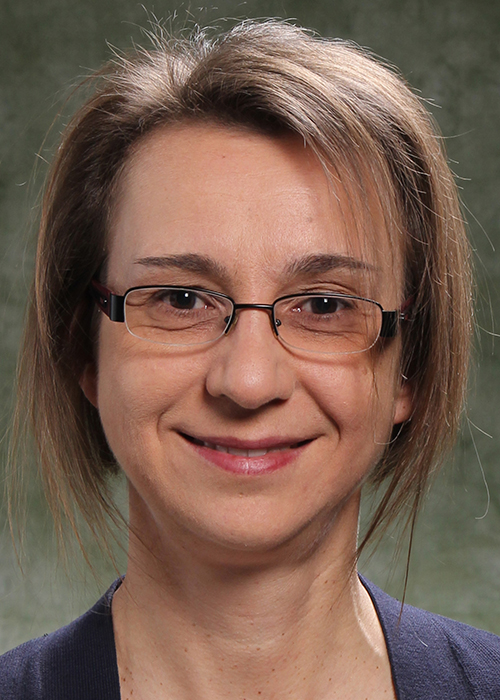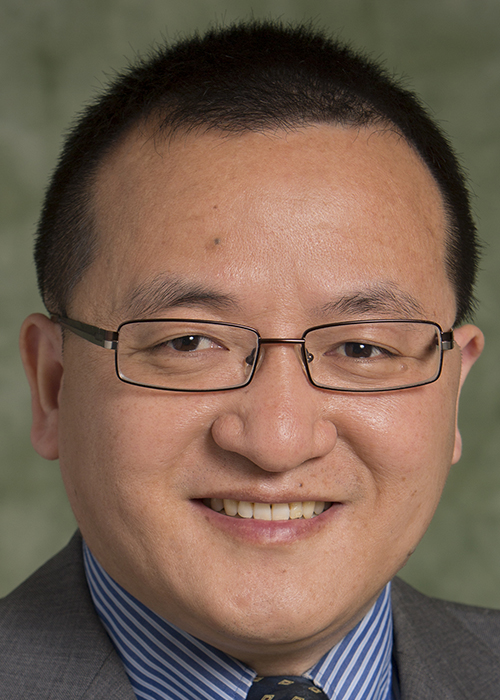Seven Binghamton University faculty members elevated to SUNY distinguished professors
Title reserved for those who have achieved national or international prominence and exemplary reputations within their disciplines

Seven Binghamton University faculty members have been elevated to distinguished professors, the highest rank that the State University of New York awards.
The title of SUNY distinguished professor is reserved for those who have achieved national or international prominence and exemplary reputations within their disciplines. Four of the professors are from the Thomas J. Watson College of Engineering and Applied Science, two are from the Harpur College of Arts and Sciences, and one is from the School of Pharmacy and Pharmaceutical Sciences.
Currently, 37 other active Binghamton faculty hold the titles of distinguished, distinguished teaching or distinguished service professor.
“My congratulations go out to those who have joined the ranks of SUNY’s distinguished faculty,” said President Harvey Stenger. “These faculty members are international leaders in their fields of study, and all of us at Binghamton University are immensely proud to call them peers and colleagues. I thank the newest distinguished faculty for their dedication to research and scholarship and for their work in advancing the reputation of Binghamton University.”
“I celebrate the broad achievements of this year’s inductees as SUNY distinguished faculty,” said Executive Vice President for Academic Affairs and Provost Donald Hall. “To earn this promotion, faculty have had to contribute significantly to their field through many years of innovative scholarly work that distinguishes them from their counterparts at institutions across the country and around the world. We are incredibly fortunate to have these faculty members at Binghamton, and I want to congratulate them on this most deserving recognition.”
Harpur College
David L. Cingranelli
Distinguished Professor of Political Science
Cingranelli is a leading figure in the scientific study of human rights. He led the effort to create one of the first data sets on human rights: the CIRIGHTS Data Project, which changed the study of human rights in the social sciences.
Faculty and students at five universities in the U.S. and U.K. now help the project score human rights. Quantitative studies, rare before Cingranelli’s efforts, now account for more than half of human rights studies published in the social sciences.
“We measure what we treasure. Our scoring project helps people learn about their rights and the obligations of national governments to respect them. Citizens are better able to hold their governments accountable for poor performance,” he said.
“Teaching people about their rights hopefully leads to better protection. In any case, if we don’t measure human rights, we won’t know whether anything we do makes human rights better or worse.”
Karin Sauer
Distinguished Professor of Biological Sciences
Among the top 2% of researchers in her field, Sauer is internationally known for her research in microbial biofilms, particularly Pseudomonas aerugiosa, a human pathogen tied to poor outcomes in cystic fibrosis and other human diseases. Biofilms are slimy substances secreted by bacteria that allow adherence to surfaces, including surgical implants and infected tissues. These biofilms render bacteria resistant to antibiotics or the body’s defenses.
Sauer, who was elected this year as a fellow of the American Academy of Microbiology, discovered the biochemical and genetic mechanisms that regulate how biofilms disperse to release individual bacteria that may then spread the infection. Her studies provide a new target for treating biofilms and biofilm drug resistance that will guide future therapies.
“I’m honored and excited by this recognition of my career to date,” she said. “I think the next decade will see some tremendous progress in applying our work to improve human health, especially for people who suffer from chronic infections such as those who have surgically implanted medical devices.”
School of Pharmacy
Kanneboyina Nagaraju
Dean and Distinguished Professor of Pharmaceutical Sciences
Before coming to Binghamton University, Nagaraju was a faculty member at Johns Hopkins University and George Washington University. At Binghamton, he served as founding chair of the Department of Pharmaceutical Sciences and vice dean for the School of Pharmacy and Pharmaceutical Sciences (SOPPS), then was elevated to dean in 2022.
Nagaraju is an expert on translational research in autoimmune and genetic muscle diseases. He has authored over 200 refereed publications and several textbook chapters on autoimmune muscle diseases. He has led international efforts to define reliable and sensitive tests for drug efficacy in mouse models of neuromuscular diseases and directed a state-of-the-art preclinical drug-testing facility dedicated to neuromuscular disorders.
In collaboration with Eric Hoffman and John McCall, he developed Vamorolone (AGAMREE), a potent anti-inflammatory drug that recently received approval from the Food and Drug Administration and European Medicines Agency.
“I am grateful and honored to receive a prestigious SUNY distinguished professorship,” he said. “I am thankful to all my mentors who shaped my academic career and scientific thinking to investigate rarer forms of human disease over the last three decades. It is quite a satisfying academic and personal journey for me.”
Watson College
SB Park
Distinguished Professor of Mechanical Engineering
Park is a world expert in advanced semiconductor and electronics packaging. His contribution to academia and industry has been highly regarded, and his research findings have helped to advance consumer electronics and high-performance computing devices and systems.
He was recognized as a fellow by the American Society of Mechanical Engineers (ASME) for his research, and the Institute of Electrical and Electronics Engineers (IEEE) named him a fellow of the organization, an honor that puts him among 0.1% of its 427,000-plus membership in more than 190 countries.
As the director of the Integrated Electronics Engineering Center (IEEC), a New York State Center for Advanced Technologies, which includes a broad range of industry partners, Park has done groundbreaking work since joining the Binghamton University faculty in 2002. His expertise in advanced electronics packaging contributes to the center in conducting ongoing and prospective projects.
Park earned his bachelor’s and master’s degrees from Seoul National University in his native Korea, and his PhD at Purdue University. He began his professional career at IBM Corp. in Endicott and East Fishkill, N.Y., where he conducted analyses to put products out on time. Later, he was engaged in reliability engineering responsible for flip-chip technology and high-performance packaging.
“I am very happy to be honored and lucky to be surrounded by many distinguished colleagues and brilliant students,” Park said. “My productivity and my contributions to the technical communities would not be possible without them. I am also deeply indebted to the Binghamton University leadership in fostering my career.”
Hiroki Sayama
Distinguished Professor of Systems Science and Industrial Engineering
Sayama is director of the Binghamton Center of Complex Systems (CoCo), and his research interests include complex dynamical networks, human and social dynamics, collective behaviors, artificial life/chemistry, interactive systems and complex systems education.
He is an expert on mathematical/computational modeling and analysis of various complex systems. He has published more than 230 peer-reviewed journal articles and conference proceedings papers, and he has written or edited 15 books and conference proceedings about complex systems topics. His open-access textbook on complex systems modeling and analysis has been downloaded more than 170,000 times and has become one of the standard textbooks on the subject.
Sayama serves as vice president of the International Society for Artificial Life (ISAL), an elected council / executive committee / CCS steering committee member of the Complex Systems Society, a board member of the Network Science Society (NetSci), the chief editor of Complexity (Wiley), the founding co-editor-in-chief of the Northeast Journal of Complex Systems (NEJCS), an associate editor of Artificial Life (MIT Press), and as an editorial board member for several other journals.
“I am truly honored and humbled to be promoted to a distinguished professor rank,” he said. “I view this as a recognition given to various collaborative projects and communities I helped create. They would never have been possible without my excellent collaborators, colleagues, students, staff members and administration, and everyone else I am so fortunate to have and work with. I am fully determined to continue doing my very best to contribute to the University further in the coming years.”
Lijun Yin
Distinguished Professor of Computer Science
Yin is a globally recognized expert in computer vision, affective computing and biometrics. He has pioneered the field of three-dimensional and four-dimensional modeling and recognition, especially of the human face.
Over the past 20 years, his groundbreaking development and release of 3D and 4D facial expression databases have transformed the study of facial behavior analysis. Yin’s innovative computational methods for facial modeling and analysis have significantly advanced technologies in human emotion and biometrics recognition, with wide-ranging applications in security, telecommunications, healthcare, artificial intelligence, human-computer interaction, education, psychology, social sciences, the arts and entertainment, including gaming and film production.
Yin’s scholarly output includes over 165 publications and eight patents, accumulating over 10,800 citations. His databases are utilized by more than 1,500 research groups worldwide and have been licensed to 46 companies, including tech giants. He has served as general chair and program chair at dozens of IEEE international conferences and as a member of the editorial boards of two international journals.
He leads the Center for Imaging, Acoustics and Perception Science (CIAPS), serves as director of the Graphics and Image Computing Laboratory, and is co-director of the Seymour Kunis Media Core at Watson College.
“I am honored and humbled by this promotion,” he said. “As a professor, I am privileged to work alongside outstanding students, faculty, staff and visionary leaders at our institution. This recognition reflects our shared commitment and motivates me to further enhance our multidisciplinary research efforts. I am deeply appreciative of the substantial support from my colleagues at Binghamton.”
Guangwen Zhou
Distinguished Professor of Mechanical Engineering
Zhou has established an international reputation as one of the leading research groups in in-situ/operando studies of surface and interface phenomena such as oxidation, passivation, corrosion, catalysis and electrode reactions. His investigations are driven by the need to address pressing materials challenges in environmental sustainability, energy conversion and storage, and advanced synthesis and manufacturing.
Zhou’s research endeavors have mainly been supported by the National Science Foundation (NSF) and the Department of Energy (DOE), including one DOE project that has received continuous renewal for over 18 years. He has published over 250 articles in peer-reviewed journals, and he has delivered 30 research seminars at universities and industrial research labs, along with over 40 speeches at international and national conferences.
He is a recipient of the National Science Foundation CAREER Award (2011) and SUNY Chancellor’s Award for Excellence in Scholarship and Creative Activities (2016).
“I am truly honored to receive such a prestigious title,” he said. “I am deeply grateful for the support and encouragement I have received from the entire university community throughout my academic journey. This achievement would not have been possible without the guidance of my colleagues, the dedication of my students and the unwavering commitment of our administration to excellence in education and research.
“As I embark on this new chapter in my career, I am inspired by the responsibility that comes with the title of distinguished professor. I am committed to upholding the values of scholarship, mentorship and service that define Binghamton University and to continuing to contribute to the advancement of knowledge in my field.”







